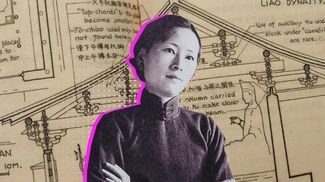Chinese netizens have mastered the art of slacking to survive in an increasingly stressful society
Social isolation may be depressing, but excessive social interactions can be equally overwhelming. Even extroverts can feel drained after listening to endless voice messages on WeChat or constantly making small talk with people they barely know. Too much socializing can even be dangerous: A 2021 study by scholars Olga Stavrova and Dongning Ren from Tilburg University in the Netherlands found that too many social interactions can result in “worse health and increased mortality risks.
Luckily, Chinese netizens have a way to cope with the pressure of being sociable in a world that demands constant communication: hunong (糊弄 hùnòng), which means to do something half-heartedly while pretending to be earnest. It is a survival skill applicable to various aspects of life. For those who feel peer pressure to hit the gym, for example, including the 20 minutes spent warming up and stretching as part of their hour-long workout routine helps them meet their daily exercise goals more easily. However, the most common and useful application of hunong is in the art of conversation, where it helps people still sound engaged even when they don’t feel like talking to others.
The term became popular after the official account of fast food chain Original Chicken flooded Weibo with various textual renditions of roosters’ crowing sounds “cock-a-doodle-doo,” instead of brand promotions and campaigns. Upon discovering this, the company chairman commented under a post, interrogating the account operator, “Do you always just muddle through your work like this every day (你每天就是这样糊弄工作的 Nǐ měitiān jiùshì zhèyàng hùnòng gōngzuò de)?” Despite the boss’s apparent disapproval, hunong proved effective, earning the account over 700,000 additional followers in days. Netizens quipped that the account manager had the “least stressful job in the world.” Envious netizens offered to “do the job for half the salary (他的活我也能干,只要一半工资 Tā de huó wǒ yě néng gàn, zhǐ yào yíbàn gōngzī).”
Perfunctory behavior like this has become so widespread online that the review platform and discussion forum Douban has a discussion board called hunong-ology (糊弄学 hùnòngxué), dedicated to such strategies. The underlying philosophy is that “where there is a will to muddle through, there is a way (世上无难事,只要肯糊弄 shìshàng wú nánshì, zhǐ yào kěn hùnòng).”
People who adhere to this ideology, nicknamed 弄弄子 (nòngnòngzi, slackers), strive to devote maximum time to personal goals by avoiding meaningless gossip with colleagues and steering clear of acquaintances who pry into their privacy. They have mastered the art of mindless conversations, devising situation-specific conversation formulas and general responses suitable for different scenarios.
One basic strategy involves inserting as many 哈哈 (haha) as possible in all messages to seem more friendly and interested in what the recipient is saying. For instance, when an acquaintance asks how they’re doing, instead of replying with a curt “not bad (还行 hái xíng),” they say instead “not bad, hahaha...(还行哈哈哈哈哈哈 hái xíng hahaha...)” Some netizens have even created a chart of “versatile hunong phrases (万能糊弄词 wànnéng hùnòngcí)”—vague and meaningless expressions that can be used whenever you need them. Examples include “This is too much (这个也太那个了吧 Zhège yě tài nàge le ba),” or “How can they be like that (这人真是的 Zhè rén zhēnshi de).” These phrases come in handy when others try to share gossip they don’t care about.
Hunong experts also have strategies to counter awkward questions. For instance, when relatives boast about their children’s stable government positions and express concern over their joblessness and single marital status, hunong users advise against confrontation and recommend “advancing by retreating (以退为进 yǐtuì wéijìn).” A simple acknowledgment such as “That’s really awesome (确实比较牛的 Quèshí bǐjiào niú de),” “Amazing (厉害了 Lìhai le),” or “You have a point (确实有道理 Quèshí yǒu dàolǐ)” would suffice. By tactfully concealing their true thoughts, slackers can maintain harmonious relationships while swiftly extricating themselves from uncomfortable social situations.
To add a touch of humor, a Marxist twist can be applied to the strategies. When a friend asks for advice on which of two job offers to take, instead of a straightforward “it depends (看情况 kàn qíngkuàng),” which can seem half-hearted, the hunong strategy suggests something like: “You have to look at it dialectically. Everything has pros and cons. It depends on what your main contradiction is. (这种事情需要辩证看待,有好处也有坏处,看你的主要矛盾是什么。Zhèzhǒng shìqing xūyào biànzhèng kàndài, yǒu hǎochù yě yǒu huàichù, kàn nǐ de zhǔyào máodùn shì shénme).” Another technique would be to encourage them to follow their heart by saying “practice is the sole criterion for testing truth (实践是检验真理的唯一标准 shíjiàn shì jiǎnyàn zhēnlǐ de wéiyī biāozhǔn).” These are all good ways to answer their question without actually giving advice.
In addition to the stock phrases, there are also simple templates to show one is truly listening. One formula is “exclamation + evaluation + opinion,” preferably with an emoji. For example, when a colleague complains about their partner’s bad temper, followers of hunong-ology might say: “No! That crossed a line. I couldn’t stand it if I were you. 😡 (不会吧,这也太过分了,要是我我也受不了。Búhuì ba, zhè yě tài guòfèn le, yàoshì wǒ wǒ yě shòubuliǎo.)”
Beyond linguistic prowess, hunong, the ultimate energy-saving toolkit, also proves useful in areas like cooking and babysitting. For example, “cooking hunong-ology (做饭糊弄学 zuòfàn hùnòngxué)” is about making meals that may not be delicious but maintain your vital signs. A classic hunong meal can be whipped up quickly and simply: throw whatever’s in the fridge in a wok and fry it up. Instead of serving the food in a large bowl, hunong chefs might use half of a devoured watermelon so there’s one less dish to wash.
Parents who follow the creed trust that “if the parents are careless enough, the kids can learn to look after themselves (只要父母足够糊弄,孩子就能自己学着长大 zhǐyào fùmǔ zúgòu hùnòng, háizi jiù néng zìjǐ xué zhe zhǎngdà).” Instead of giving in to their kids’ every cry for a new toy, they patiently play on their phones and wait for the wailing to cease. Even more ingeniously, they might “behave like a child so the child has to behave themselves (走孩子的路,让孩子无路可走 zǒu háizi de lù, ràng háizi wúlù kězǒu).”
Embracing the art of hunong supposedly empowers individuals to navigate our exhausting world with essential energy-saving tricks, striking a delicate balance between meaningful engagement and the need for personal space. As the motto of Douban’s hunong-ology group goes, “Life is short. It’s okay to hunong once in a while. (人生苦短,糊弄一下也没什么大不了。Rénshēng kǔduǎn, hùnòng yíxià yě méi shénme dàbuliǎo.)”














